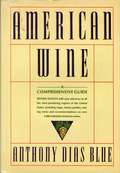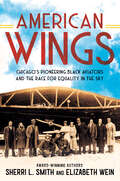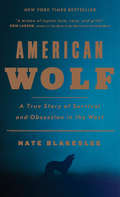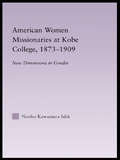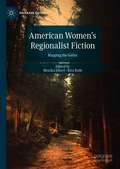- Table View
- List View
American Will
by Bobby JindalGovernor Bobby Jindal of Louisiana, a much-talked-about 2016 presidential candidate, offers fourteen lessons from our nation's past and discusses how they can be used to restore American courage, faith, and wisdom.Nearly forty-five years ago, Bobby Jindal's parents left their home in rural India--a place with no electricity or running water--to build a new life in the United States. Every day, Jindal's father told him, "You should be grateful that you were blessed to be born in the greatest country in the history of the world"--a country where the son of poor immigrants could grow up to become the governor of Louisiana. For Jindal, this defining experience bolsters a profound belief in American exceptionalism: Freedom is not just the American way, it's the American will. As we approach the next great turning point in this extraordinary nation's remarkable history, Jindal brings to life inspiring stories from our country's past that have influenced his beliefs and the indispensable lessons each can teach us about our future. Stories such as the stalwart senator who galvanized the public against Hillary Clinton's costly and oppressive socialist health-care proposal in the early 1990s; the entrepreneur whose dogged determination ushered in a worldwide energy revolution, and with it technological innovation and economic growth; and the Founding Father who refused to "lead from behind" and instead used his vision for the nascent nation's vast potential and the best interests of its people to outwit a greedy dictator. In the next election, we can continue down the current destructive path of big government, emboldened enemies, diminished liberties, and hostility to religious faith. Or we can embrace the values that have always propelled America to the top: limited government; free people and free markets; strength and exceptionalism; and the essential role of religious faith in effecting change. American power is precious, and our vital interests and those of our allies depend on strong leadership. Whom will we choose: a cynic or a statesman, a politician or a problem solver? The dramatic tales in American Will illuminate the courage, faith, and vision that we need in 2016--and the government folly, corruption, and myopia that jeopardize our future.
American Wine Economics
by James ThorntonThe U.S. wine industry is growing rapidly and wine consumption is an increasingly important part of American culture. American Wine Economics is intended for students of economics, wine professionals, and general readers who seek to gain a unified and systematic understanding of the economic organization of the wine trade. The wine industry possesses unique characteristics that make it interesting to study from an economic perspective. This volume delivers up-to-date information about complex attributes of wine; grape growing, wine production, and wine distribution activities; wine firms and consumers; grape and wine markets; and wine globalization. Thornton employs economic principles to explain how grape growers, wine producers, distributors, retailers, and consumers interact and influence the wine market. The volume includes a summary of findings and presents insights from the growing body of studies related to wine economics. Economic concepts, supplemented by numerous examples and anecdotes, are used to gain insight into wine firm behavior and the importance of contractual arrangements in the industry. Thornton also provides a detailed analysis of wine consumer behavior and what studies reveal about the factors that dictate wine-buying decisions.
American Wine: A Coming-of-Age Story
by Tom AcitelliThe story of how the United States came to dominate fine wine In 1976, the bicentennial year of American Independence, the nation's wine was an international afterthought--stylistically and commercially. Within a generation, however, the United States would stand unquestionably at the world vanguard of wine, reversing centuries of Euro-centrism and dominating the fruit of the vine so thoroughly that Europeans were forced to adopt American words to describe their own creations. In the process, it spawned a wine culture and became intertwined with a kind of aspirational living: American fine wine became a foundational element of gourmet food, reality TV, a myriad of print publications and blogs, expensive vacation packages, gift catalogues, and even the plot of an Oscar-winning movie. Using primary sources, including interviews with the major figures in the rise of American fine wine, the book traces the controversial personalities and seismic events that led to American commercial and stylistic dominance of the world's most celebrated alcoholic beverage--a dominance that shows no signs of waning.
American Winescapes: The Cultural Landscapes Of America's Wine Country (Geographies Of Imagination Ser.)
by Gary L PetersWinescapes are unique agricultural landscapes that are shaped by the presence of vineyards, wine-making activities, and the wineries where wines are produced and stored. Where viticulture is successful it transforms the local landscape into a combination of agriculture, industry, and tourism. This book demystifies viticulture in a way that helps the reader understand the environmental and economic conditions necessary in the art and practice of wine making.Distinctive characteristics of the book include a detailed discussion of more than thirty grape cultivars, an overview of wine regions around the country, and a survey of wine publications and festivals. Gary Peters discusses the major environmental conditions affecting viticulture, especially weather and climate, and outlines the special problems the industry faces from lack of capital, competition, and changing public tastes. }Winescapes are unique agricultural landscapes that are shaped by the presence of vineyards, wine-making activities, and the wineries where wines are produced and stored. Where viticulture is successful it transforms the local landscape into a combination of agriculture, industry, and tourism. This book demystifies viticulture in a way that helps the reader understand the environmental and economic conditions necessary in the art and practice of wine making.Distinctive characteristics of the book include a detailed discussion of more than thirty grape cultivars, an overview of wine regions around the country, and a survey of wine publications and festivals. Gary Peters discusses the major environmental conditions affecting viticulture, especially weather and climate, and outlines the special problems the industry faces from lack of capital, competition, and changing public tastes. }
American Wings: Chicago's Pioneering Black Aviators and the Race for Equality in the Sky
by Elizabeth Wein Sherri L. SmithFrom the acclaimed author of Flygirl and the bestselling author of Code Name Verity comes the thrilling and inspiring true story of the desegregation of the skies.&“This beautiful and brilliant history of not only what it means to be Black and dream of flying but to, against every odd, do so, completely blew me away.&” —Jacqueline Woodson, National Book Award Winner for Brown Girl DreamingIn the years between World War I and World War II, aviation fever was everywhere, including among Black Americans. But what hope did a Black person have of learning to fly in a country constricted by prejudice and Jim Crow laws, where Black aviators like Bessie Coleman had to move to France to earn their wings?American Wings follows a group of determined Black Americans: Cornelius Coffey and Johnny Robinson, skilled auto mechanics; Janet Harmon Bragg, a nurse; and Willa Brown, a teacher and social worker. Together, they created a flying club and built their own airfield south of Chicago. As the U.S. hurtled toward World War II, they established a school to train new pilots, teaching both Black and white students together and proving, in a time when the U.S. military was still segregated, that successful integration was possible.Featuring rare historical photographs, American Wings brings to light a hidden history of pioneering Black men and women who, with grit and resilience, battled powerful odds for an equal share of the sky.
American Wino: A Tale of Reds, Whites, and One Man's Blues
by Dan DunnA professional booze writer whose life spins out of control tries to piece it back together by embarking upon an epic wine-fueled adventure that takes him to every corner of the U.S. Part vision quest, part guidebook, part journey into the bizarre tapestry of American life, it will make you laugh, make you cry and teach you a whole lot about wine.Former Playboy magazine nightlife columnist Dan Dunn has a made a career out of drinking. Yet this man’s man—a connoisseur of beer and whiskey—knew next to nothing about one of the major drinks enjoyed the world over: wine. When a fateful tasting experience coincided with a serious existential crisis, Dunn decided to hit the road on a journey of discovery. To quench his thirst for knowledge (and be able to throw down with the experts), he would educate himself about the industry glass by glass, from winery to winery, in nearly every region in the United States.His bold 15,000-mile road trip took Dunn from Sonoma, California, to Pawley’s Island, South Carolina, where he twirled, sniffed, and sipped glass after glass of a vast array of wines with vintners, savants, and celebrities, including Kurt Russell and “The Most Interesting Man in the World,” Jonathan Goldsmith. Dunn’s mission was to transform himself from a heartbroken schlub who barely knew the difference between Merlot and Meritage, into a confident connoisseur capable of wowing others simply by swirling some fermented grape juice around in his mouth and pronouncing it “troubling, yet brilliant.”In American Wino, Dunn shares it all—the good, the bad, the sublime. As his wine knowledge grows and becomes more complex, he shares it with the reader in the form of digestible, actionable nuggets in each chapter. It’s like a wine-tasting course at your local community college extension program, only with more sex and less crushing despair. An intoxicating blend of travel writing, memoir, and booze journalism that pairs earthy humor with fine wine for hilarious and enlightening results, it is the story of one man’s journey to find himself—and everyman’s journey to better understand the true spirit of this divine elixir.
American Witches: A Broomstick Tour through Four Centuries
by Susan FairThe history of American witches is way weirder than you ever imagined. From bewitched pigs hell-bent on revenge to gruesome twentieth-century murders, American Witches reveals strange incidents of witchcraft that have long been swept under the rug as bizarre sidenotes to history.On a tour through history that’s both whimsical and startling, we’ll encounter seventeenth-century children flying around inside their New England home ?like geese.” We’ll meet a father-son team of pious Puritans who embarked on a mission that involved undressing ladies and overseeing hangings. And on the eve of the Civil War, we’ll accompany a reporter as he dons a dress and goes searching for witches in New York City’s most dangerous neighborhoods.Entertainingly readable and rich in amazing details often left out of today’s texts, American Witches casts a flickering torchlight into the dark corners of American history.
American Witness: The Art and Life of Robert Frank
by Rj SmithFrom the author of the acclaimed James Brown biography The One comes the first in-depth biography of renowned photographer and filmmaker Robert Frank, best known for his landmark book The Americans.As well-known as Robert Frank the photographer is, few can say they really know Robert Frank the man. Born and raised in wartime Switzerland, Frank discovered the power and allure of photography at an early age and quickly learned that the art meant significantly more to him than the money, success, or fame. The art was all, and he intended to spend a lifetime pursuing it.American Witness is the first comprehensive look at the life of a man who's as mysterious and evasive as he is prolific and gifted. Leaving his rigid Switzerland for the more fluid United States in 1947, Frank found himself at the red-hot social center of bohemian New York in the '50s and '60s, becoming friends with everyone from Jack Kerouac, Allen Ginsberg, and Peter Orlovsky to photographer Walker Evans, actor Zero Mostel, painter Willem de Kooning, filmmaker Jonas Mekas, Bob Dylan, writer Rudy Wirlitzer, jazz musicians Ornette Coleman and Charles Mingus, and more. Frank roamed the country with his young family, taking roughly 27,000 photographs and collecting 83 of them into what is still his most famous work: The Americans. His was an America nobody had seen before, and if it was harshly criticized upon publication for its portrait of a divided country, the collection gradually grew to be recognized as a transformative American vision.And then he turned his back on certain success, giving up photography to reinvent himself as a film and video maker. Frank helped found the American independent cinema of the 1960s and made a legendary film with the Rolling Stones. Today, the nonagenarian is an embodiment of restless creativity and a symbol of what it costs to remain original in America, his life defined by never repeating himself, never being satisfied. American Witness is a portrait of a singular artist and the country that he saw.
American Wolf: A True Story of Survival and Obsession in the West
by Nate BlakesleeThe enthralling story of the rise and reign of O-Six, the celebrated Yellowstone wolf, and the people who loved or feared her <P><P>Before men ruled the earth, there were wolves. Once abundant in North America, these majestic creatures were hunted to near extinction in the lower 48 states by the 1920s. But in recent decades, conservationists have brought wolves back to the Rockies, igniting a battle over the very soul of the West. With novelistic detail, Nate Blakeslee tells the gripping story of one of these wolves, O-Six, a charismatic alpha female named for the year of her birth. <P><P>Uncommonly powerful, with gray fur and faint black ovals around each eye, O-Six is a kind and merciful leader, a fiercely intelligent fighter, and a doting mother. She is beloved by wolf watchers, particularly renowned naturalist Rick McIntyre, and becomes something of a social media star, with followers around the world. <P><P>But as she raises her pups and protects her pack, O-Six is challenged on all fronts: by hunters, who compete with wolves for the elk they both prize; by cattle ranchers who are losing livestock and have the ear of politicians; and by other Yellowstone wolves who are vying for control of the park’s stunningly beautiful Lamar Valley. <P><P>These forces collide in American Wolf, a riveting multigenerational saga of hardship and triumph that tells a larger story about the ongoing cultural clash in the West—between those fighting for a vanishing way of life and those committed to restoring one of the country’s most iconic landscapes.
American Woman: The Transformation of the Modern First Lady, from Hillary Clinton to Jill Biden
by Katie RogersThe first definitive exploration of the changing role of the twenty-first-century First Lady, painting a comprehensive portrait of Jill Biden—from a White House correspondent for The New York Times&“A fascinating and deeply researched exploration into the most public facing and least understood role in Washington.&”—Kate Andersen Brower, #1 New York Times bestselling author of The Residence and First WomenSince the Clinton era, shifts in media, politics, and pop culture have all redefined expectations of First Ladies, even as the boundaries set upon them have often remained anachronistic. With sharp insights and dozens of firsthand interviews with major players in the Biden, Obama, Trump, Bush, and Clinton orbits, including Jill Biden and Hillary Clinton, New York Times White House correspondent Katie Rogers traces the evolution of the role of the twenty-first-century First Lady from a ceremonial figurehead to a powerful political operator, which culminates in the tenure of First Lady Jill Biden. Dr. Jill Biden began her journey toward public life in 1975 as a twenty-three-year-old who caught the eye of a widowed Senator Joe Biden. Recovering from the heartbreak of her failed first marriage, she found a man who was still grieving. She knitted his life together after unspeakable tragedy and stood by his side through three presidential campaigns. In some ways, her legacy as First Lady was set before she ever entered the White House: She is the first presidential spouse in history to work in a paid role outside the White House, a decision that blazes the path for future first spouses. But as a prime guardian of one of the most insular operations in modern politics, she is also a central part of her husband&’s presidential legacy. Through deep reporting and newly discovered correspondence, American Woman is the first book to paint a full picture of Jill Biden while exploring how she helps answer the evolving question of what the role of the modern First Lady should be.
American Women Activists and Autobiography: Rhetorical Lives (Routledge Studies in Rhetoric and Communication)
by Heather OstmanAmerican Women Activists and Autobiography examines the feminist rhetorics that emerge in six very different activists’ autobiographies, as they simultaneously tell the stories of unconventional women’s lives and manifest the authors’ arguments for social and political change, as well as provide blueprints for creating tectonic shifts in American society. Exploring self-narratives by six diverse women at the forefront of radical social change since 1900—Jane Addams, Emma Goldman, Dorothy Day, Angela Davis, Mary Crow Dog, and Betty Friedan—the author offers a breadth of perspectives to current dialogues on motherhood, essentialism, race, class, and feminism, and highlights the shifts in situated feminist rhetorics through the course of the last one hundred years. This book is a timely instructional resource for all scholars and graduate students in rhetorical studies, composition, American literature, women's studies, feminist rhetorics, and social justice.
American Women Gain the Right to Vote (Events That Changed Your World Ser.)
by Marcia Amidon LustedToday, most adults can vote in the United States. But to get here many groups have had to fight for that right—including women. In 1920, women across the country finally gained the right to choose their representatives in government. With historical images and details about key events before and after the passage of the amendment that granted women the right to vote, this book will help kids understand the impact of the amendment on voting rights in the United States. Uncover the details of events that changed your world in this Pebble Explore series.
American Women In World War I
by Lettie GavinInterweaving personal stories with historical photos and background, this lively account documents the history of the more than 40,000 women who served in relief and military duty during World War I. Through personal interviews and excerpts from diaries, letters, and memoirs, Lettie Gavin relates poignant stories of women's wartime experiences and provides a unique perspective on their progress in military service. American Women in World War I captures the spirit of these determined patriots and their times for every reader and will be of special interest to military, women's, and social historians.
American Women Missionaries at Kobe College, 1873-1909: New Dimensions In Gender (East Asia: History, Politics, Sociology and Culture)
by Noriko Kawamura IshiiThis study examines one aspect of American women's professionalization and the implications of the cross-cultural dialogue between American woman missionaries and Japanese students and supporters at Kobe College between 1873 and 1909.
American Women Poets in the 21st Century: Where Lyric Meets Language
by Juliana Spahr Claudia RankineA thought-provoking mix of poetry, creative manifesto and criticism.
American Women and Flight since 1940: since 1940
by Deborah G. Douglas“Individual women’s stories enliven almost every page” of this comprehensive illustrated reference, now updated, from the National Air and Space Museum (Technology and Culture).Women run wind tunnel experiments, direct air traffic, and fabricate airplanes. American women have been involved with flight from the beginning. But until 1940, most people believed women could not fly, that Amelia Earhart was an exception to the rule. World War II changed everything. “It is on the record that women can fly as well as men,” stated General Henry H. Arnold, commanding general of the Army Air Forces. Then the question became “Should women fly?” Deborah G. Douglas tells the story of this ongoing debate and its impact on American history. From Jackie Cochran, whose perseverance led to the formation of the Women’s Army Service Pilots (WASP) during World War II to the more recent achievements of Jeannie Flynn, the Air Force’s first woman fighter pilot and Eileen Collins, NASA’s first woman shuttle commander, Douglas introduces a host of determined women who overcame prejudice and became military fliers, airline pilots, and air and space engineers. Not forgotten are stories of flight attendants, air traffic controllers, and mechanics. American Women and Flight since 1940 is a revised and expanded edition of a Smithsonian National Air and Space Museum reference work. Long considered the single best reference work in the field, this new edition contains extensive new illustrations and a comprehensive bibliography.
American Women and the Repeal of Prohibition (The American Social Experience #17)
by Kenneth D RoseIn 1933 Americans did something they had never done before: they voted to repeal an amendment to the U.S. Constitution. The Eighteenth Amendment, which for 13 years had prohibited the manufacture and sale of alcoholic beverages, was nullified by the passage of another amendment, the Twenty-First. Many factors helped create this remarkable turn of events. One factor that was essential, Kenneth D. Rose here argues, was the presence of a large number of well-organized women promoting repeal. Even more remarkable than the appearance of these women on the political scene was the approach they took to the politics of repeal. Intriguingly, the arguments employed by repeal women and by prohibition women were often mirror images of each other, even though the women on the two sides of the issue pursued diametrically opposed political agendas. Rose contends that a distinguishing feature of the women's repeal movement was an argument for home protection, a social feminist ideology that women repealists shared with the prohibitionist women of the Women's Christian Temperance Union. The book surveys the women's movement to repeal national prohibition and places it within the contexts of women's temperance activity, women's political activity during the 1920s, and the campaign for repeal. While recent years have seen much-needed attention devoted to the recovery of women's history, conservative women have too often been overlooked, deliberately ignored, or written off as unworthy of scrutiny. With American Women and the Repeal of Prohibition, Kenneth Rose fleshes out a crucial chapter in the history of American women and culture.
American Women during World War II: An Encyclopedia
by Doris WeatherfordAmerican Women during World War II documents the lives and stories of women who contributed directly to the war effort via official and semi-official military organizations, as well as the millions of women who worked in civilian defense industries, ranging from aircraft maintenance to munitions manufacturing and much more. It also illuminates how the war changed the lives of women in more traditional home front roles. All women had to cope with rationing of basic household goods, and most women volunteered in war-related programs. Other entries discuss institutional change, as the war affected every aspect of life, including as schools, hospitals, and even religion. American Women during World War II provides a handy one-volume collection of information and images suitable for any public or professional library.
American Women in World War I: They Also Served
by Lettie GavinInterweaving personal stories with historical photos and background, this lively account documents the history of the more than 40,000 women who served in relief and military duty during World War I. Through personal interviews and excerpts from diaries, letters, and memoirs, Lettie Gavin relates poignant stories of women's wartime experiences and provides a unique perspective on their progress in military service. American Women in World War I captures the spirit of these determined patriots and their times for every reader and will be of special interest to military, women's, and social historians.
American Women's History: A New Narrative History (Women, Gender, And Sexuality In American History Ser. #1)
by Vanessa M. Holden Maeve Kane Melissa E. BlairOffers a nuanced account of the multiple aspects of women’s lives and their roles in American society American Women's History presents a comprehensive survey of women's experience in the U.S. and North America from pre-European contact to the present. Centering women of color and incorporating issues of sexuality and gender, this student-friendly textbook draws from cutting-edge scholarship to provide a more inclusive and complicated perspective on the conventional narrative of U.S. women’s history. Throughout the text, the authors highlight diverse voices such as Matoaka (Pocahontas), Hilletie van Olinda, Margaret Sanger, and Annelle Ponder. Arranged chronologically, American Women's History explores the major turning points in American women’s history while exploring various contexts surrounding race, work, politics, activism, and the construction of self. Concise chapters cover a uniquely wide range of topics, such as the roles of Indigenous women in North American cultures, the ways women participated in the American Revolution, the lives of women of color in the antebellum South and their experiences with slave resistance and rebellion, the radical transformation brought on by Black women during Reconstruction, the activism of women before and after suffrage was won, and more. Discusses how Indigenous women navigated cross-cultural contact and resisted assimilation efforts after the arrival of Europeans Considers the construction of Black female bodies and the implications of the slave trade in the Americas Addresses the cultural shifts, demographic changes, and women’s rights movements of the early twentieth century Highlights women’s participation in movements for civil rights, workplace justice, and equal educational opportunities Explores the feminist movement and its accomplishments, the rise of anti-feminism, and women’s influence on the modern political landscapeDesigned for both one- and two-semester U.S. history courses, American Women's History is an ideal resource for instructors looking for a streamlined textbook that will complement existing primary sources that work well in their classes. Due to its focus on women of color, it is particularly valuable for community colleges and other institutions with diverse student populations.
American Women's Regionalist Fiction: Mapping the Gothic (Palgrave Gothic)
by Monika Elbert Rita BodeAmerican Women’s Regionalist Fiction: Mapping the Gothic seeks to redress the monolithic vision of American Gothic by analyzing the various sectional or regional attempts to Gothicize what is most claustrophobic or peculiar about local history. Since women writers were often relegated to inferior status, it is especially compelling to look at women from the Gothic perspective. The regionalist Gothic develops along the line of difference and not unity—thus emphasizing regional peculiarities or a sense of superiority in terms of regional history, natural landscapes, immigrant customs, folk tales, or idiosyncratic ways. The essays study the uncanny or the haunting quality of “the commonplace,” as Hawthorne would have it in his introduction to The House of the Seven Gables, in regionalist Gothic fiction by a wide range of women writers between ca. 1850 and 1930. This collection seeks to examine how/if the regionalist perspective is small, limited, and stultifying and leads to Gothic moments, or whether the intersection between local and national leads to a clash that is jarring and Gothic in nature.
American Women's Suffrage: Voices from the Long Struggle for the Vote 1776-1965 (The Library of America)
In their own voices, the full story of the women and men who struggled to make American democracy wholeWith a record number of female candidates in the 2020 election and women's rights an increasingly urgent topic in the news, it's crucial that we understand the history that got us where we are now. For the first time, here is the full, definitive story of the movement for voting rights for American women, of every race, told through the voices of the women and men who lived it. Here are the most recognizable figures in the campaign for women's suffrage, like Elizabeth Cady Stanton and Susan B. Anthony, but also the black, Chinese, and American Indian women and men who were not only essential to the movement but expanded its directions and aims. Here, too, are the anti-suffragists who worried about where the country would head if the right to vote were universal. Expertly curated and introduced by scholar Susan Ware, each piece is prefaced by a headnote so that together these 100 selections by over 80 writers tell the full history of the movement--from Abigail Adams to the 1848 Declaration of Sentiments to the ratification of the Nineteenth Amendment in 1920 and the limiting of suffrage under Jim Crow. Importantly, it carries the story to 1965, and the passage of the Voting and Civil Rights Acts, which finally secured suffrage for all American women. Includes writings by Ida B. Wells, Mabel Lee, Margaret Fuller, Sojourner Truth, Frances Ellen Watkins Harper, Frederick Douglass, presidents Grover Cleveland on the anti-suffrage side and Woodrow Wilson urging passage of the Nineteenth Amendment as a wartime measure, Jane Addams, and Charlotte Perkins Gilman, among many others.
American Women: A Concise History
by Susan WareAmerican Women: A Concise History offers the most accessible and engaging introduction to the history of American women” --Provided by publisher.
American Workers, American Unions
by Robert H. Zieger Timothy J. Minchin Gilbert J. GallHighly acclaimed and widely read since its first publication in 1986, American Workers, American Unions provides a concise and compelling history of American workers and their unions in the twentieth century and the first decade of the twenty-first. Taking into account recent important work on the 1970s and the Reagan revolution, the fourth edition newly considers the stagflation issue, the rise of globalization and big box retailing, the failure of Congress to pass legislation supporting the right of public employees to collective bargaining, the defeat in Congress of legislation to revise the National Labor Relations Act, the emasculation of the Humphrey-Hawkins Act, and the changing dynamics of blue-collar politics. In addition to important new information on the 1970s and 1980s, the fourth edition contains a completely new final chapter. Largely written by Timothy J. Minchin, this chapter provides a rare survey of American workers and their unions between 9/11 and the 2012 presidential election. Gilbert J. Gall presents new information on government workers and their recent battles to defend workplace rights.



